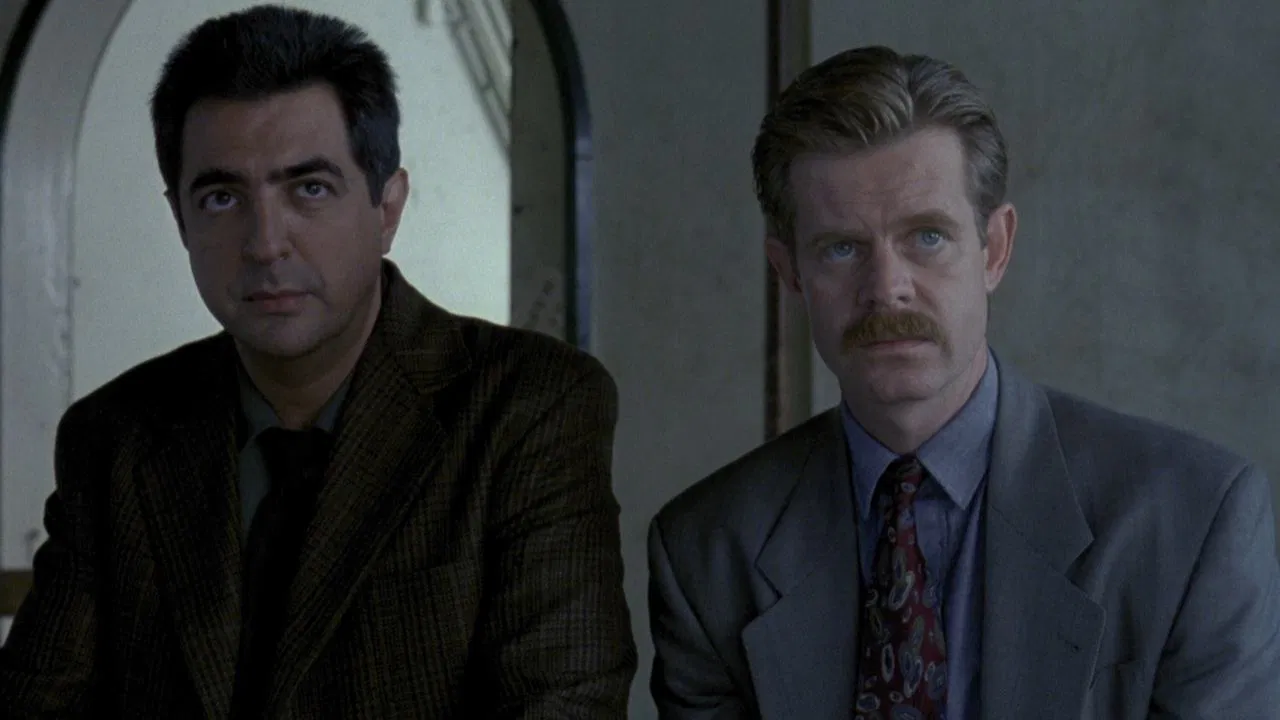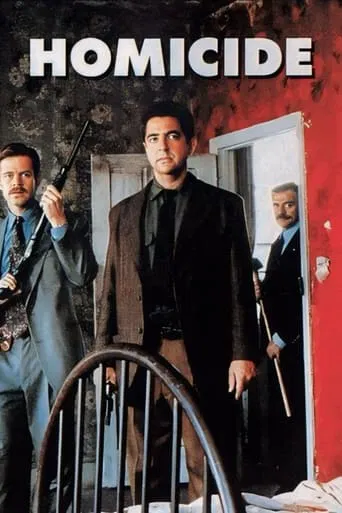

Self-important, over-dramatic, uninspired.
... View MoreThis movie feels like it was made purely to piss off people who want good shows
... View MoreA great movie, one of the best of this year. There was a bit of confusion at one point in the plot, but nothing serious.
... View MoreBy the time the dramatic fireworks start popping off, each one feels earned.
... View MoreThere's a scene in Homicide when a police detective uses the phone in the library of a moneyed Jewish doctor who's grumbled about shots being fired on the roof. The detective begrudges being pulled off a high-profile drug bust because the influential doctor has asked for him. If we had the same amount of time and space to contemplate what we say as it does to write it, we'd all sound like writers. And standing at the phone, the detective lets loose a rigidly interlaced, giftedly prearranged, impeccably performed river of four-letter vulgarities and anti-Semitic comments. Only Mamet could write, and maybe only his then favorite actor Mantegna could play, this dialogue so frankly and persuasively, and yet with such spoken fluency that it has the autonomy of ad-libbing. Then the cop turns around...and he sees that he's not alone in the room. The doctor's daughter, in one of Rebecca Pidgeon's strongest, and smallest, performances, has heard every coarse, vinegary word. She knows something we also know: This cop's Jewish himself. And because she heard him, she compels him to face what he's actually saying.Set in a nameless, menacing city that's all antiquated storefronts and squat apartment buildings, this low-key but complex web of enigma and suspicion reminiscent of the dialogue-driven narratives of classic Hollywood, is about a man awakening to himself. As the story begins, Detective Bobby Gold, the Mantegna character, is a cop who places his job first, his individual selfhood last. He does not think much about being Jewish. When he gets in a fix with a black superior who calls him a kike, he's all set to come to blows, but we intuit that his resentment develops more out of departmental enmity than an individual feeling of offense. Throughout the movie, Mamet's characters exercise the most candid street language in their ethnic and licentious back-and-forth, as if somehow getting the spite open to the elements is a step forward.Gold's fuming about the doctor because the murder of the doctor's mother was the occasion of Gold being pulled off the big drug case. The mother, an obstinate old lady, ran a cornerstore in a black ghetto. She didn't need the money, but she declined to move, and she's shot dead in a robbery. Bobby, speeding toward the drug bust with his partner, comes across the scene of the crime by chance. "I'm not here. You didn't see me." But the old woman's son, who has sway downtown, wants him assigned to the case. Because Gold's Jewish, the doctor thinks, he'll truly be concerned. The doctor has the wrong man. What Mamet's having a go at here, I feel, is uniting the composition of a thriller with the gist of an identity transformation. The two cases get all mishmashed throughout, the black dealer on the run, the murdered old lady, and, from a theoretical angle, Bobby's not going to be able to solve who did anything until he solves who he is.Mamet owns the copyright on oblique, repetitive dialogue steeped in pathos, and this third directorial effort, a great example of a film whose bare-bones VHS and DVD releases go out of print and are salvaged by the relatively recent cinema aficionado DVD collective distributions, namely Criterion, hisses with liveliness and kick, and with offhand colloquial dialogue by Mamet, who takes down-to-earth dialectic design and abridges them into a form of hardened, straight-thinking verse. He's a filmmaker with a lucid awareness of how he wants to advance. He applies the rudiments of time-honored standards, the con game, the mistaken identity, the personal crisis, the cop picture, as scaffold for movies that ask questions like: Who's real? Who can you trust? What do people truly want? Here he has more than a few of his favorite actors, who've made their bones in Mamet stage productions: Mantegna, the now veteran Macy, Jack Wallace, the intriguing character actor/magician Ricky Jay.I must concede that once again with Mamet's work, I get the impression that the actors are so tied down to the stringent verbatim requirements of delivering his dialogue that they can't entirely let go, be spontaneous, but force a repetitious of something that must be just so. But nevertheless, they seem to genuinely listen to each other and respond, to have shaped around Mamet's steel architecture. After all, the emotional thread is there, and it's strong. A consistent yarn in Mamet's film work is his intellectual use of editing, combining one shot to the next to elicit a line of reasoning, so we make clear sense of the emotions extracted by his story. We feel it even before Gold, or we, realize his relationship to the significant situation, his stakes in it, his fears and desires, and most of all, his challenges. He and all his partners are guys with contour haircuts who smoke cigarettes like they require them, not a cast of weather-beaten teen coverboys. They're middle-aged, stressed and weary. And Mamet makes them clear from their present actions. We get the impression that Bobby Gold is not in harmony with his Jewish identity as, like many of his partners, he has let the job replace the person. Gold has become so case-hardened, he doesn't even know how he sounds, until he hears himself through that woman.Mamet's dialogue may be extremely mannered and lyrical, but it still serves the story the right way: It evokes, not decides, the reading of a scene, calls up the imagination to give a minimal context upon which the actor establishes character. Evocation, imagination, minimalism, character: Right up the alley of every good writer in every medium it concerns.
... View MoreI realized about the existence of HOMICIDE, through the website of the Criterion Collection, around this year's July. It was announced in the Criterion site as one of their coming soon titles (it was released three moths ago) so and since it gained my attention more than other Criterion titles I immediately investigated about the existence of its R4 DVD. Turned out it does existed, but I wasn't able to find it at my usual store. Last weekend in a walmart I decided to check out the DVDs and to my surprise and joy there it was the R4 DVD of Mamet's 1991 film.Joe Mantegna plays a Jewish detective (Bob Gold), and is like we are always ready for the more conventional things, ready to accept and enjoy those things just because we like Mantegna's character. Mantegna's performance is great and that is part of why when the whole thing is conventional material we accept the whole thing, we really enjoy it. I mean, the film begins with the FBI dropping a case that now out detectives will take (Mantegna's detective and the partner, Macy's character, Tim Sullivan), and is just like the conventional problems for our characters, they did their job just about fine but still they get the blame. The main issue here is that these two, Bob and Tim, gain us immediately, there is enough to see that both are good cops and, principally, there's this part in which we see that both are real partners (just after we know that Bob is Jewish). The film continues to be a simple cop film, and I loved those moments: is like, Bob ain't a very lucky man and finally the moment he is going to work on a really big case (words about how is bob) the moment we confirm about his lack of luck.It's just about having Bob into something and something else that seems more important going on Maybe going for the conspiration thing was the move expected by us but is like Mamet reminds to us that this is all about a man, a man who is Jewish but can't "" , a man who has no family, a man, I will for once cite the description that comes in the box of the R4 DVD, who thinks is doing the right thing. It's pretty darn hard the ending because it makes you think, it makes you think in Tim getting killed but mostly in what Bob is thinking after receiving the promised help of a random guy who shot his family and was treated fairly well by Bob. It's not satisfying as a conventional thriller but that's why it's great, and hell just seeing Mantegna going for this and going for that is a joy (Macy is not really that many minutes in the screen). 9.5 out of 10
... View MoreDavid Mamet is a very interesting and a very un-equal director. His first movie 'House of Games' was the one I liked best, and it set a series of films with characters whose perspective of life changes as they get into complicated situations, and so does the perspective of the viewer.So is 'Homicide' which from the title tries to set the mind of the viewer to the usual crime drama. The principal characters are two cops, one Jewish and one Irish who deal with a racially charged area. The murder of an old Jewish shop owner who proves to be an ancient veteran of the Israeli Independence war triggers the Jewish identity in the mind and heart of the Jewish detective.This is were the flaws of the film are the more obvious. The process of awakening is theatrical and hard to believe, the group of Jewish militants is operatic, and the way the detective eventually walks to the final violent confrontation is pathetic. The end of the film itself is Mamet-like smart, but disappoints from a human emotional perspective.Joe Mantegna and William Macy give strong performances, but the flaws of the story are too evident to be easily compensated.
... View MoreGood people become bad in a group. They lose their vision when it is subverted by the group vision. You see this in government. You see it in religion. You see it in this film. Gold knows what is right. He is offended by a black city official's anti-semitism. He is appalled by the Nazi atrocities against Jews. He wants to help, only to be betrayed by Jews who hold their cause above their humanity. Unto yourself be true.
... View More